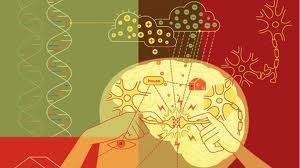
Neuroplasticity refers to changes in the neural pathways and synapses due to changes in behavior, the environment, neural processes, thinking, emotions and bodily injuries. Neuroplasticity happens on a variety of levels, ranging from cellular changes because of learning, to large-scale changes with cortical remapping in response to injury. Neuroscientists believed that the brain is immutable after a critical period during childhood, but new studies have revealed that many parts of the brain remain plastic into adulthood.
The brain is malleable, in continues to change in the response to your lifestyle, physiology, emotions, and the environment. Your choices influence your brain and how the brain remains and how it continues to function as you age. The brain has the ability to recognize pathways, create new connections, and create new neurons throughout your life.
As time goes by, science provides more and more evidence that your brain is malleable and continually changing in response to your lifestyle, physiology, and environment.
This concept is called neuroplasticity, or brain plasticity—meaning, you are literally reforming your brain with each passing day. It used to be thought that your brain was static, except during some critical developmental periods, but today, we know this isn’t true.
This, too, has been disproven by researchers like Bruce Lipton, who have introduced an entirely new branch of biological science called epigenetics. Your DNA changes continuously based on your experiences, emotions, and environment.
New Study Shows How Quickly Your Brain Can Rewire Itself
A recent study discussed in Scientific American illuminates your brain’s remarkable ability to rewire itself in response to experience. Mice with amblyopia or “lazy eye” (partial blindness caused by visual deprivation early in life) improved faster if they were exposed to visual stimuli while running …
![]() Feeding your brain is just as important as feeding your stomach. Exercising also exercises the brain, not just mental exercises, but physical as well. Exercising promotes the growth of new cells in the brain, enlarge memory cells, improve IQ, and prevent brain deterioration. When you do high-intensity interval training it boosts the long-term memory and reduces the risk of dementia. Exercise helps nerve cells release brain-derived neurotrophic factor (BDNF). This part of the brain can trigger chemicals that improve brain health and benefit brain functions. If you fast while exercising it can release BDNF and can keep the brain and muscles biologically young.
Feeding your brain is just as important as feeding your stomach. Exercising also exercises the brain, not just mental exercises, but physical as well. Exercising promotes the growth of new cells in the brain, enlarge memory cells, improve IQ, and prevent brain deterioration. When you do high-intensity interval training it boosts the long-term memory and reduces the risk of dementia. Exercise helps nerve cells release brain-derived neurotrophic factor (BDNF). This part of the brain can trigger chemicals that improve brain health and benefit brain functions. If you fast while exercising it can release BDNF and can keep the brain and muscles biologically young.
Please Read this Article at Aticles.Mercola.com





Leave a Reply